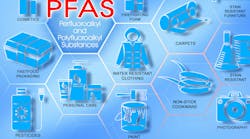by Dawn C. Kristof, WWEMA President
Imagine sitting in an airplane two miles above land looking out over a beautiful landscape with rugged mountains on one side and a crystal lake on the other. The sun's rays reflect off the water, shooting diamond-like sparks of light into the sky. Thoughts of peace and tranquility run through your mind until you are suddenly interrupted. The airplane door opens. A blast of arctic air fills the cabin. All your senses are awakened. The plane's hovering at 13,500 feet. The pilot screams "Jump!"
Skydiving – what an experience! The risk is real. The reward is indescribable. Perhaps my own desire to skydive was driven, in part, to compensate for the risk-adverse nature of the business we're in. The water quality industry is, by its very nature, comprised of scientifically-disciplined, engineer-oriented professionals who are - for the most part – conservative in their approach toward business. This is especially true when it comes to new technology.
With so many new contaminants to treat, watersheds to restore, facilities and distribution systems to repair, and critical infrastructure to protect, one would think that the water and wastewater market would be ripe for embracing new technologies. History tells us otherwise.
Since joining this industry back in 1976, I have participated in numerous stakeholder meetings, workshops and seminars where the topic of technology innovation in the water industry (or lack thereof!) has been discussed. Certainly there have been substantial improvements made in expanding design life of facilities, attaining greater energy efficiencies, automating systems, reusing wastewater, and enhancing treatment capabilities. I would submit that a lot had to do with product enhancements more than process innovations.
Why a dearth in innovation? Without the potential for reward, taking a risk is foolhardy. What motivation is there for a company to invest in researching, developing and patenting new technologies when it is met with resistance in a marketplace that places open competition before innovation? What company has sufficient funds to spend years conducting bench-scale testing, pilot testing and full-scale testing only to have it repeated at site after site, in community after community, from state to state, in order to get its technology permitted? What incentive is there for consultants to specify new techniques when their reputation is on the line? Why would a community try something new when failure is not an option, especially when facing a court order to perform?
We need a system that rewards risk taking if we are ever to release the innovative spirit that lies in our community of water quality professionals. The innovators – many of which exist in our membership – must be rewarded for getting patents and being allowed to sell proprietary technologies. The consultants must be recognized for their innovative designs and be able to share in any cost savings with their customer. The community must be given some degree of flexibility by regulators to try new approaches which offer promising results without fearing fines for permit violations. Finally, the regulators must be willing to accept independent validations of product test results, instead of demanding repeat testing on a site-specific basis.
Easier said than done, I know. We all have a role in sharing the risk if we are to achieve the reward. A good place to begin is at the WEFTEC '04 when our industry converges on New Orleans in October. I hope everyone who attends this year's show takes the time to walk the hall, talk to the exhibitors, and share views about what tomorrow's technology could bring.
I realize change is slow in coming in an industry charged with protecting public health and our environmental resources. Notwithstanding, let us open our eyes to the possibilities of how technology can transform our industry for the better, if only we are willing to take a risk . . . and a 'leap' of faith!
About the author:
Dawn Kristof is president of the Water and Wastewater Equipment Manufacturers Association. WWEMA is a Washington-D.C. based, non-profit trade association founded in 1908 to be the national voice for the water and wastewater equipment industry.


